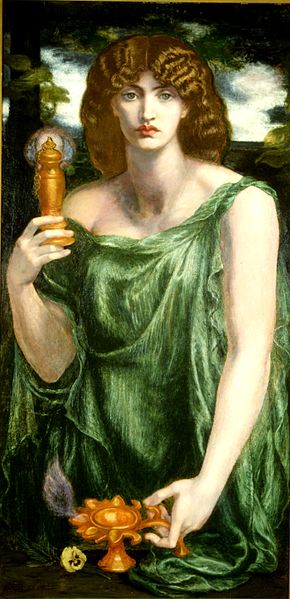“Please excuse my dear aunt Sally.”
This helpful phrase was created to help people remember the mathematical order of operations:
parentheses, exponents, multiplication, division, addition, and subtraction.
Phrases like these are called “mnemonics.”
They’re tools to help people remember complicated concepts. What most people don’t know is that mnemonics are called mnemonics for a reason.
The word “mnemonic” is Greek in origin, and it’s related to the mythological figure Mnemosyne.
In some traditions, Mnemosyne was a god.
In others, she was a Titan. Whatever she was, it is known that she ruled over the domain of memory and was viewed as one of the essential building blocks of civilization.
Origins of Mnemosyne
According to Greek tradition, Mnemosyne was the daughter of Gaea, the earth; and Uranus, the sky. This is why she was considered a Titan. She was the sister of Cronus, the leader of the Titans and the father of the Greek gods.
She was also related to the Hecatoncheires, the so-called “hundred-handed ones” and the Cyclopes, the one-eyed giants responsible for forging Zeus’s lightning bolts.
Despite her association with the titans, Mnemosyne might not have fought alongside them during the war against the gods. People living today may never find out. Since the original story of that war, the Titanomachia, has been lost to history.
Regardless, she is mentioned in myths that take place after the fall of the titans. She was still worshipped by the ancient Greeks long after the titans went out of fashion.

Mnemosyne Siblings
Mnemosyne, the Greek goddess of memory and one of the Titan deities, was a daughter of Uranus (the sky) and Gaia (the earth). She had several siblings,( six brothers and five sisters) who were also Titans.
- Cronus: The leader of the Titans, who overthrew his father Uranus and later was overthrown by his own son Zeus.
- Rhea: Cronus’s sister and wife, mother of the Olympian gods including Zeus, Hera, Poseidon, Hestia, and Demeter.
- Oceanus: The Titan god of the great, earth-encircling river Okeanos.
- Tethys: The Titan goddess of the primal font of fresh water which nourishes the earth, sister and wife of Oceanus.
- Hyperion: The Titan of light, father of the sun god Helios, the moon goddess Selene, and the dawn goddess Eos.
- Theia: The Titaness of sight and the bright sky, married to Hyperion.
- Coeus: The Titan of intelligence and the axis of heaven around which the constellations revolved.
- Phoebe: The Titaness of the bright intellect and prophecy, married to Coeus.
- Iapetus: The Titan of mortality and father of Prometheus, Epimetheus, Menoetius, and Atlas.
- Themis: The Titaness of divine law and order.
- Crius: The least individualized among the Titans, and over whom the lot of the heavenly constellations fell.
The Muses
Mnemosyne had an important role amongst the gods. According to myth, Mnemosyne was the mother of the muses, the goddesses of art, literature, science, and inspiration. The nine muses—Calliope, Clio, Euterpe, Erato, Melpomene, Polyhymnia, Terpsichore, Thalia, and Urania—were supposedly the children of Mnemosyne and Zeus.
Greek poets and storytellers often called upon the muses before reciting their work, and sometimes, they would even call upon their mother Mnemosyne.
The Greek philosopher Plato, in his work Euthydemus, began by invoking “the Muses and Memory,” or Mnemosyne! Clearly Mnemosyne was an important character in the Greek tradition. To the Greeks, there was a direct link between memory and myth.
The Underworld
Mnemosyne also had a negative counterpart in Hades, the Greek underworld. According to myth, a river called Lethe flowed out from the Styx in the east. The River Lethe was sometimes believed to be the physical embodiment of a goddess of the same name, Lethe: goddess of forgetfulness and oblivion. The dead who wandered the Asphodel Meadows—the realm for souls who were neither good nor evil in life—were forced to drink from the River Lethe in order to forget their lives.
According to the poet Orpheus, though, there was a way to overcome the forgetfulness of the Lethe. Orpheus, who journeyed into the underworld to rescue his wife Eurydice from death, spoke of a pool in Hades that would allow the dead to retain their memories. This pool was called Mnemosyne! Those who drank from the pool of Mnemosyne retained the memories of their past life.
Worship of Mnemosyne
While she was not as widely worshipped as any of the twelve Olympians, Mnemosyne did have her followers. Not only was she mentioned alongside her daughters, but she was also worshipped in temples to other gods. There were statues to her in temples to Dionysus and Athena and she was instrumental in the rituals of the oracle of Trophonius.
Offerings to Mnemosyne were often made by those expecting to receive visions in their dreams. They hoped that Mnemosyne would accept the offerings and help them remember their visions when they woke up. This tradition was especially popular among cultists of Asclepius, a healer said to be capable of bringing the dead back to life.
Link/cite this page
If you use any of the content on this page in your own work, please use the code below to cite this page as the source of the content.
Link will appear as Mnemosyne – The Goddess of Memory: https://greekgodsandgoddesses.net - Greek Gods & Goddesses, October 23, 2019